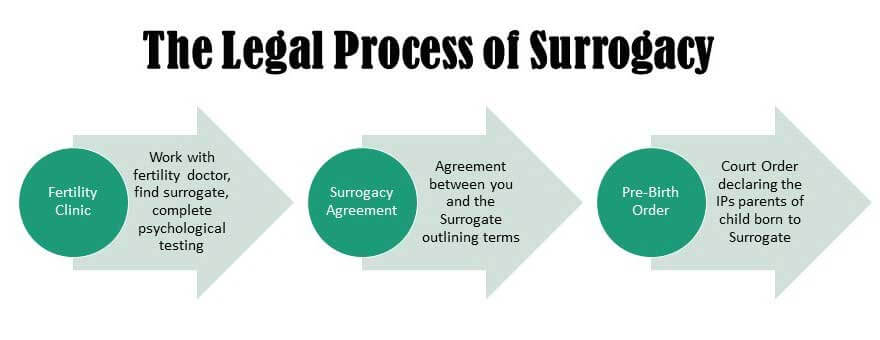The process of becoming parents is always a special one, but with gestational surrogacy, the path to parenthood is especially unique — and sometimes complicated. Just how does gestational surrogacy work in North Carolina?
As some of the most experienced surrogacy attorneys in North Carolina, Parker Herring Law Group, PLLC can provide all of the guidance, information and legal services you need to successfully complete the surrogacy process, step by step.
Here, learn more about how surrogacy works in North Carolina.
1. Find a Surrogate
Before retaining a surrogacy attorney, the first steps for surrogacy are to complete the necessary screening and find a pre-approved surrogate who is physically and mentally fit to carry a surrogate pregnancy.
There are many surrogacy programs, agencies and fertility clinics in North Carolina that can assist you with the matching and screening process. Our past clients have especially found success working with the following organizations:
- Carolina Conceptions
- North Carolina Center for Reproductive Medicine
- Duke Fertility Center
- UNC Fertility
- Atlantic Reproduction
Each professional may vary in its screening requirements, matching process, costs and more, so it is important to do careful research and choose the best fertility clinic to help you meet your individual surrogacy goals.
2. Begin the Legal Process of Surrogacy
The legal part of the surrogacy process begins after you have located a surrogate (gestational carrier), passed the psychological examinations and received the go-ahead from your fertility doctor.
At this point in the North Carolina surrogacy process, you can contact Parker Herring Law Group, PLLC to schedule an initial consultation. Prior to the consultation, you will receive a copy of the fee agreement and client information form, which can be executed during the consultation.
Consultations are done on the 21st floor (Suite 2135) of our downtown Raleigh office at 434 Fayetteville Street (the BB&T Building). We recommend you allow about one and a half hours for your consultation, as the attorney will review the terms of the agreement with you, page by page, and go over the various items specific to your situation.

3. Draft and Sign the Surrogacy Agreement
Most fertility doctors require individuals/couples using a surrogate to work with an attorney to have a contract, typically called a gestational carrier agreement or surrogacy agreement, drawn up and executed by all parties.
This contract is one of the most important parts of the legal surrogacy process, as it clearly outlines each party’s expectations regarding issues such as:
- the roles and responsibilities of each party
- surrogate compensation
- procedures to establish parentage during the pregnancy
- agreement on procedures if the child in utero is diagnosed with a severe disability
- what to do if there is a disagreement
- health and life insurance
Following your consultation, we will draft a surrogacy agreement and forward it to you for review. If you approve the Agreement as-is, we will send the draft directly to your surrogate. The draft will be sent with a cover letter instructing the surrogate to review it with her own attorney, and we provide a list of local attorneys we recommend.
To begin the surrogacy agreement process with our firm, call the office and ask to speak to Parker Herring, or email her:
Parker Herring: pherring@weputfamiliesfirst.com
4. Retain an Independent Surrogate Attorney
When we represent the intended parents and prepare a surrogacy agreement, we require the surrogate review the Agreement with her own attorney prior to signing. The intended parents pay the surrogate’s attorney fees. This policy protects the interests of all parties as it ensures everyone is fully aware of the terms of the Agreement before signing.
Following the surrogate’s meeting with her attorney, our office will be notified of any revisions requested or if the Agreement is satisfactory as-is. Any requested changes will be sent to the intended parents to approve or reject, and any necessary negotiations are handled between attorneys. Once this has been completed, our office will make arrangements for all parties to sign.
5. Begin the Medical Surrogacy Procedure
Once contracts have been signed, a copy will be provided to the fertility clinic, and the surrogate can begin the surrogacy medical process. This process typically involves a number of fertility medications, in vitro fertilization (IVF), one or more embryo transfer attempts and a number of other important appointments and screenings to monitor the surrogate’s health. Once a healthy pregnancy is confirmed, the surrogate will begin receiving monthly payments as outlined in the surrogacy agreement.
Throughout the medical surrogacy process, it is important to keep your attorney informed of the progress of the fertility treatments and any resulting pregnancy. This will allow your attorney to contact you in time to begin the process of obtaining a pre-birth order of parentage.
6. Obtain a Pre-Birth Order
In every gestational surrogacy process, legal procedures are required to establish parentage — that is, to ensure you are recognized as your child’s legal parents and that your names appear on your child’s birth certificate.
There are three ways to complete this process:
- Obtaining a pre-birth order from the court
- Amending the birth certificate to remove the surrogate’s name
- Adopting the child after birth
At Parker Herring Law Group, PLLC, we can explain each of these options in more detail; however, it is possible to obtain a pre-birth order in almost every surrogacy case in North Carolina. This is typically the easiest of your three options and will direct the hospital to list you on your child’s original birth certificate, rather than the surrogate (and her husband, if applicable).
Your attorney will begin the pre-birth process around 20 weeks into the pregnancy to ensure the court order is in place before the child is born. To obtain a pre-birth order, all parties will need to sign affidavits prepared by Parker Herring Law Group, PLLC, including the doctor who performed the embryo transfer at your fertility clinic. Your attorney will then file these affidavits, along with a formal Complaint, with the Court.
The surrogate and her husband will be served with the Complaint, and the Court will then execute the pre-birth parentage order establishing you as the child’s legal parents.
With a pre-birth order in place, not only will your names appear on your child’s original birth certificate, but you will also be able to make medical decisions for your child and take him or her home from the hospital. This eliminates the need for additional legal steps, such as an adoption or a birth certificate amendment.

—
With the surrogacy services and expertise of the attorneys and staff at Parker Herring Law Group, PLLC, you can feel confident that every step of the North Carolina surrogacy process has been completed legally and that you will be ready to welcome your new son or daughter into your family. We have handled surrogacy cases routinely as part of our practices for many years.
To learn more about how surrogacy is done with our firm, call 919-821-1860 or contact us online to schedule a consultation.
